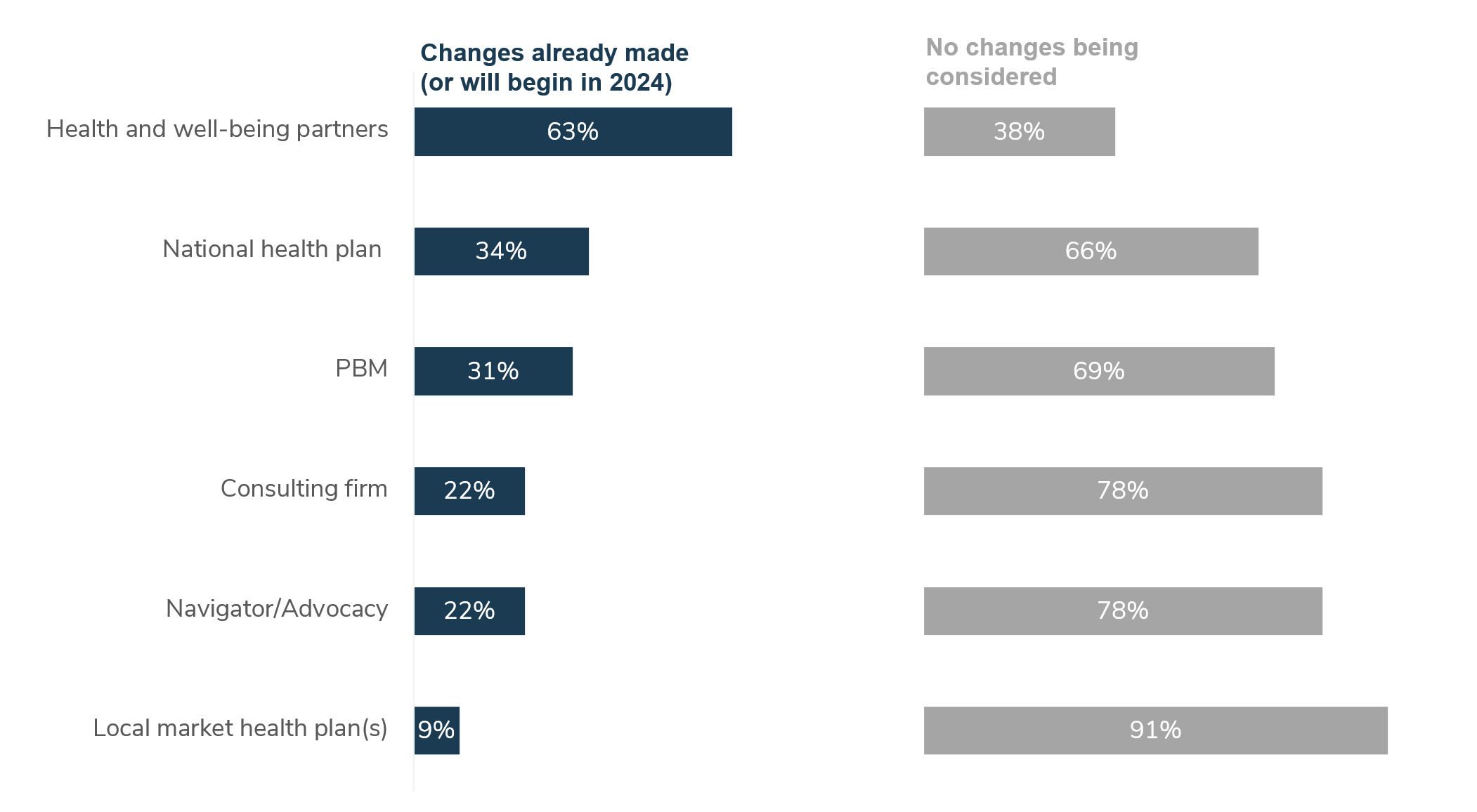February 06, 2024
Given rising health care costs, a shifting economic landscape, inflationary pressures and a competitive job market, among other obstacles, employers are evaluating their vendor partnerships. The consensus is clear: to deliver maximum value to employees and the organization, it's imperative to ensure that vendor contracts and service agreements deliver value, transparency and enable an excellent member experience. The consensus comports with recent trends reported in the Business Group’s 2024 Large Employer Health Care Strategy Survey, which shows employers are more focused on holding vendors accountable to deliver greater transparency of results, pricing and contractual terms. This employer-only call offered a platform to share insights on navigating the procurement process, emphasizing the significance of performance-driven contracts and service agreements to foster cost-efficiency and high-quality service.
The following text provides an overview of the key themes and best practices in vendor procurement shared on the call.
 Strategic Evaluation of Vendor Partnerships
Strategic Evaluation of Vendor Partnerships
Amidst an environment that demands both innovation and fiscal prudence, employers discussed proactive measures in reassessing vendor relationships, particularly with health plans, pharmacy benefit managers (PBMs), consulting firms and other health and well-being service providers. More specifically, when polled, employers on the call expressed the greatest interest in changes to partner relationships with health and well-being partners (63%), national health plans (34%) and PBMs (31%) (Figure 1). A few employers shared their journey of transitioning to more cost-effective partnerships without compromising on service quality. Employers remarked how this journey often necessitates monitoring areas of opportunity and innovation in the market, which for many is being done through thoughtfully conducting requests for information (RFIs) and requests for proposals (RFPs), as well as pursuing other contractual measures to ensure services being delivered are cost-effective. For instance, based on their team’s assessment, one employer emphasized a shift towards partnerships that offer more innovative health solutions, such as digital health platforms, to enhance employee well-being while managing costs effectively.

The use of consulting firms was also highlighted as a critical component to guide the RFP process. These firms offer expertise in framing the right questions and identifying potential vendors that align with the company's goals, thus facilitating a more informed decision-making process. For instance, consulting firms can conduct thorough market research, manage RFIs and RFPs, audit/monitor claims, assess vendor capabilities and provide valuable benchmarks and procurement frameworks to help employers make strategic choices. This ensures a compliant and efficient vendor selection process.
Another area employers are focused on is improving the employee experience through vendor integration. Employers highlighted strategies like streamlining access to vendor services via centralized platforms, enabling easier navigation for employees seeking health and well-being resources. This approach not only simplifies the user experience but also fosters greater engagement with available health benefits.
 Internal Collaboration and RFP Management
Internal Collaboration and RFP Management
Many employers on the call noted the prominent role internal sourcing/procurement teams play in the vendor RFP process, with several discussing their best strategies for collaboration with those teams. A notable challenge highlighted was the delineation of roles and expectations between total rewards/benefits teams and procurement/sourcing departments. Employers shared their approaches to managing this partnership effectively, ensuring clarity in roles and expectations. One employer described their method of conducting RFPs, where the procurement team takes the lead in gathering proposals and the benefits team then evaluates these proposals against a set of predefined criteria, ensuring alignment with the organization's strategic health and wellness objectives.
Navigating the intricacies of global vendor procurement was a key discussion point. Employers acknowledged the challenges of managing diverse regulatory environments and cultural nuances, highlighting a successful approach that combines the expertise of global consultants with the insights of local brokers. This hybrid strategy enables companies to tailor their procurement strategies while adhering to corporate objectives across different geographies.
Another employer showcased their commitment to continuous adaptation by conducting annual vendor evaluations to swiftly respond to changing market conditions and regulatory requirements. This proactive approach ensures their vendor partnerships remain compliant and relevant in a globalized landscape.
 Approaches to RFI and RFP
Execution
Approaches to RFI and RFP
Execution
Employers on the call shared their aspirations to continuously adopt strategic, innovative approaches in their RFP processes. This includes leveraging data and analytics to assess current vendor performance and identify areas for improvement or replacement. One example discussed was the application of performance-based metrics in RFPs to ensure potential vendors meet specific benchmarks related to cost savings, employee satisfaction and service innovation. Taking this a step further, one employer shared their practice of creating an internal scorecard, requiring vendors to complete it annually. This proactive approach has enabled the employer to track vendors’ commitments, and in some cases, they have terminated relationships with vendors who failed to keep pace with innovation.
In Conclusion
The call resonated with a shared recognition that vendor procurement strategies must continuously adapt and evolve to keep pace with industry changes and innovations. The discussion highlighted the importance of strategic evaluation, internal collaboration, innovative RFP execution and navigating global challenges as key components of successful vendor procurement in today's dynamic health care landscape.
More Topics
Articles & Guides
This content is for Employer members with internal-facing benefit roles only. Already a member?
Login
![]()
